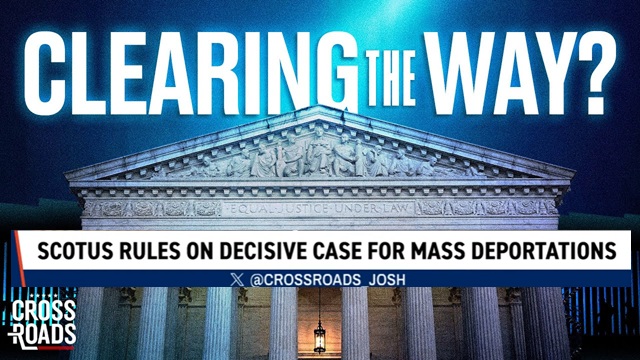 Supreme Court Paves Way for Mass Deportations of Undocumented Immigrants
Supreme Court Paves Way for Mass Deportations of Undocumented Immigrants
My analysis of the video: "SCOTUS Rules 9–0 on Decisive Case for Mass Deportations" published in an episode of "Crossroads" hosted by Joshua Philipp.
Unanimous Supreme Court Decision Limits Legal Resources in Deportation Cases
The United States Supreme Court has issued a unanimous ruling with significant implications for future immigration policies. In a 9-0 decision, both liberal and conservative justices determined that federal courts do not have the authority to review the Federal Government's decisions regarding the revocation of immigration visas.
Justice Ketanji Brown Jackson, author of the decision in the case "Bofa vs. Mayorkas," established that the Department of Homeland Security (DHS) has fundamental discretion in these decisions, without the possibility of judicial review. This decision gives the DHS Secretary the authority to revoke the approval of any visa petition when deemed justified.
Implications for Mass Deportations
The recent Supreme Court ruling has profound implications for implementing large-scale deportations. Eliminating the possibility of judicial review of visa revocation decisions significantly reduces the ability of activist groups and legal organizations to delay or prevent deportation processes through individual litigation.
This decision is particularly significant because:
- It avoids the possibility of courts being overwhelmed with millions of individual cases
- It accelerates the deportation process by eliminating a common legal appeal route
- It strengthens executive authority in immigration policy
Latest Measures of the Biden Administration
Asylum Policy Changes
The Biden-Harris administration has implemented significant last-minute changes in its approach to immigration:
- There is an approximate 33% reduction in asylum case approval rates, according to studies by Syracuse University
- Decrease in the implementation of mass migration policies
- Less flexibility in the evaluation of asylum cases
Actions Before the Administration Change
The Biden-Harris administration is taking steps to impact Trump's future immigration policies:
- Sale and relocation of border wall materials
- Evaluation of possible additional protections for certain groups of immigrants
- Developing executive actions to protect illegal immigrants before Trump takes office
- Desperately seeking support to oppose deportation by labeling it as cruel family separation
Legal Consequences for Opponents of Deportations
Legal Framework and Penalties
The consequences for those attempting to obstruct deportations are severe:
- Federal criminal charges for harboring undocumented immigrants
- Mandatory minimum sentence of 3 years for protecting foreigners with criminal backgrounds
- Penalties of up to 10 years in prison in aggravated cases
Scope of Sanctions
The next border czar, Tom Homan, has warned that legal actions could reach:
- Elected officials, including members of Congress
- Governors and mayors
- Any individual or organization actively interfering in the deportation process
Impact on Local Governments and Organizations
Efforts to resist at the state and municipal level face serious challenges:
- Risk of federal prosecution for sanctuary jurisdictions
- Limitations on local government's ability to protect undocumented immigrants
- Possible conflicts between state and federal laws in immigration matters
The Border Wall: Obstacles to Its Construction
Auction of Wall Materials
The current administration is proceeding with the sale and relocation of materials intended for the construction of the border wall. According to reports from the Daily Wire, large amounts of materials are being moved from stations in Nogales, Tucson, and Three Points, Arizona, to be auctioned at significantly reduced prices.
Implications and Trump’s Response
Donald Trump ha criticado estas acciones a través de Truth Social, argumentando que la venta de materiales a precios reducidos resultará en costos triplicados para la futura construcción del muro. Las autoridades de Texas han expresado su intención de participar en las subastas para comprar y preservar los materiales para la futura construccción del muro fronterizo que emprenderá la administración Trump.
Estas situaciones generadas por el régimen Biden-Harris tienen el malicioso objetivo de retrasar y obstaculizar la implementación de las nuevas medidas de seguridad fronteriza de Trump, requiriendo nuevas aprobaciones presupuestarias del Congreso y un prolongado proceso de adquisición de materiales.
José Tarano is a technical producer, graphic designer, collaborator, and researcher at Patria de Martí ► and The CubanAmerican Voice ►. He holds a bachelor’s degree in Electrical Engineering in Telecommunications from José Antonio Echeverria Superior Polytechnic Institute (ISPJAE). In addition, he is the founder and director of Electronics JR Computer Design and Service ►, a computer and information technology services company. Originally from Santiago de las Vegas, Havana, Cuba, he currently resides in the United States.


 🖋️Author Jose Tarano
🖋️Author Jose Tarano